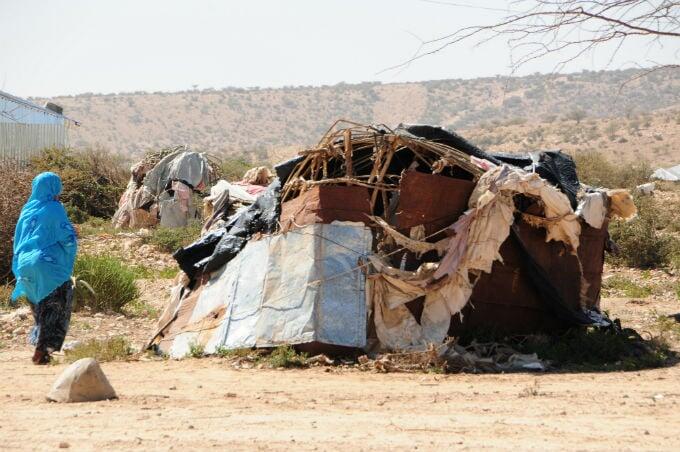Rukiyo Ahmed, 26, discovered she was pregnant just as drought started ravaging her village, Eelbuh in the Puntland State of Somalia. Her household lost all its livestock. The drought became so bad that Rukiyo and her family had to abandon their home and went to seek refugee with extended family members living in the Dangoroyo town, 35 kilometres away from Eelbuh.
“I was so worried that I would have a miscarriage due to the effects of the drought,” said Rukiyo, adding: “We had so little to eat. I became very weak and could barely walk.”
She said she was desperate for a baby. She had suffered two miscarriages before.
“I delivered a dead baby after three days of labour with my first pregnancy and my second baby died right after birth. Both times I was attended to by a traditional birth attendant,” said Rukiyo.New and increased health needs and challenges were experienced as a result of the effects of drought in Puntland and Somaliland where below normal rains or failures were experienced in two consecutive rainy seasons in areas hit by El Nino.
A drought rapid needs assessment in February 2016 in Puntland, which covered the regions of Bari, Nugal and Sanaag, stated that there was an urgent need to health services in the affected areas. The same assessment raised concerns on availability of functioning health facilities in the study areas, which observed to be among the major concerns during a household survey as part of the assessment. Up to 73 percent of the respondents in the study reported lack of access to health facilities. Some health facilities in the assessed villages were closed down because the largest part of villagers moved to other locations, which led to zero access of health services for the families and the communities that had remained. The government of Puntland declared the assessed regions as drought stricken on February 11, 2016 with 213,000 affected and requested humanitarian partners to provide lifesaving assistance to seriously affected communities.
UNFPA, through the coordinated health cluster response, and with funding from the United Nations Central Emergency Response Fund (CERF), supported the provision of maternal health services geared towards addressing high rates of mortality and morbidity. The CERF funds were used to purchase emergency health kits to equip health units and ensure safe delivery for pregnant mothers. The funds were also used for emergency procurement of life saving medicines, consumable and supplies targeting primary health care facilities and support to life saving services, according to Samia Hassan, UNFPA’s humanitarian coordinator in Somalia.
“We aimed at making available emergency reproductive, maternal and new-born health services for 2,300 pregnant women in all drought affected target areas. We also worked on making eemergency referral services available for 400 complicated pregnancies in the target areas,” said Hassan.
Just in February alone and within Bari region, the medical teams deployed by the Ministry of Health, with support of UNFPA reported 57 pregnant women were referred with different complications from areas hit by the drought to Bossaso and Garowe hospitals.
Rukiyo was one of the women that benefited from UNFPA’s response to the drought. She was taken to a Maternal and Child Health facilitity in Dangoroyo by her relatives and received close attention after sharing her medical history with skilled birth attendants at the facility.
When she went into labour, it was found out that her pelvis was too narrow for the baby to pass and the health facility referred her to Garowe Regional Hospital, where she underwent a caesarian section.” Rukiyo gave birth to a healthy boy.
“I now visit the health centre for postnatal care services and I have accessed birth spacing services to She to avoid early pregnancy. I have been advised to deliver in hospital when I pregnant again,” said Rukiyo.
The UN in Somalia says millions of Somalis have endured the pain of living without access to basic services for far too long. Over the last two decades, due to collapse of the health system, the state of the health sector remains in a critical situation with some of the worst health indicators in the world. Some 3.2 million people lack access to emergency health services, while 2.8 million require improved access to water, sanitation and hygiene.
According to UNFPA, during conflicts, natural disasters and other emergencies, sexual and reproductive health needs are easily overlooked – yet these needs are often staggering.
In crisis situations, one in five women of childbearing age, is likely to be pregnant. Without access to reproductive health services, these women face an increased risk of life-threatening complications. Many women also lose access to family planning, exposing them to unwanted pregnancies in perilous conditions. Women and young people also become more vulnerable to sexual violence, exploitation and HIV infection. And the hygiene needs of women and girls are often neglected.
UNFPA works closely with governments, UN agencies, community-based organizations and other partners to ensure that reproductive health is integrated into emergency responses. UNFPA deploys hygiene supplies, obstetric and family planning supplies, trained personnel, and other support to vulnerable populations, and works to ensure the needs of women and young people are served through both an emergency and the reconstruction phase.


